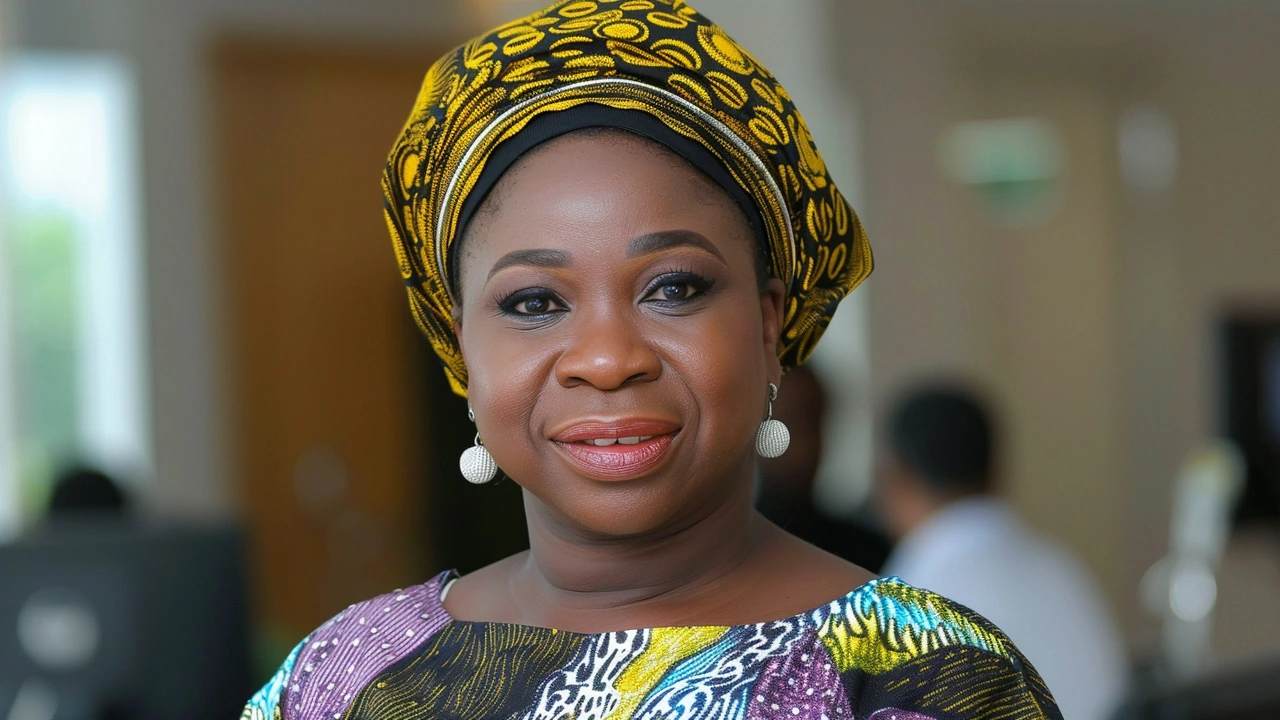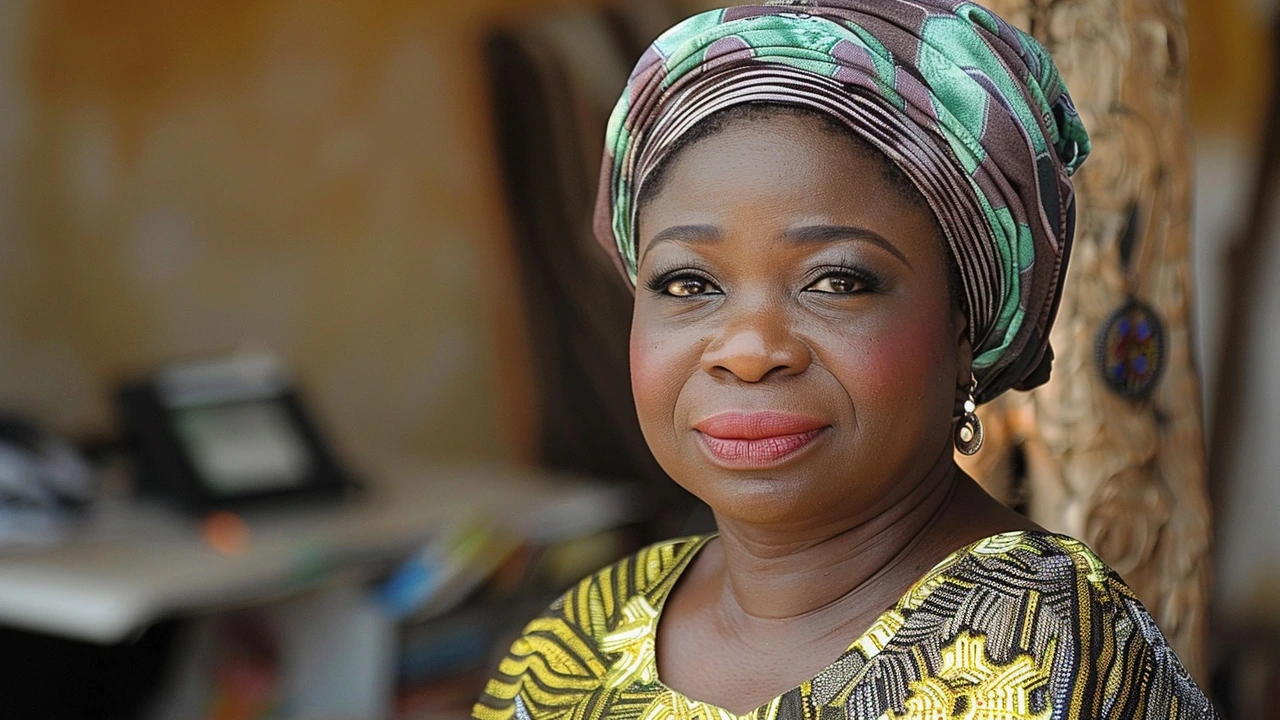Human Trafficking Crisis: Abike Dabiri-Erewa's Mission to Rescue Nigerian Girls in Ghana

Abike Dabiri-Erewa's Intervention in Ghana: A Step Towards Eradicating Human Trafficking
Abike Dabiri-Erewa, the Chairman of the Nigerians in Diaspora Commission (NiDCOM), recently took a monumental step in addressing the critical issue of human trafficking. Her visit to Ghana marked a significant move towards rescuing ten Nigerian girls who had fallen victim to the nefarious chains of traffickers. The young girls, ranging from ages 15 to 18, had been deceptively lured from Imo and Plateau states under the pretense of securing employment as 'sales girls'. Instead, they found themselves thrust into the grim realities of forced prostitution.
The rescue mission, executed with meticulous coordination by the Nigerians in Diaspora Organisation in Ghana, was a collaborative triumph involving various pivotal stakeholders. Instrumental in the operation were the Imo State Government, the Eze Igbo of Ghana, the Acting Nigerian High Commissioner to Ghana, Amb. Adeoye Ifedayo, and other key figures who turned the tide for these young victims. The commitment shown by these entities underscores a shared resolve to combat human trafficking at the grassroots and governmental levels alike.
The Dark Reality of Human Trafficking
Human trafficking remains a heinous crime, one that lurks in the shadows, preying on vulnerabilities and exploiting the innocent. Traffickers often use deceptive promises of employment or education to lure unsuspecting victims into their traps. In the case of these ten girls, the guise of becoming 'sales girls' became a gateway to a traumatic ordeal far removed from the ordinary hardships of youth. Many victims endure harrowing abuse, both physical and psychological, creating scars that often last a lifetime.
Dabiri-Erewa’s condemnation of this practice during her visit underscores the severity of the problem. She emphasized the need for stringent and sustained efforts to not only rescue victims but also to eradicate human trafficking from its very roots. A permanent solution, she noted, requires a comprehensive approach—one that involves vigilant parental supervision, community awareness, and a robust legal framework for identifying and prosecuting traffickers.
Collaboration and Cooperation: Key to Combatting Trafficking
The successful rescue operation in Ghana highlights the importance of collaboration and international cooperation in addressing human trafficking. By working together, the Nigerians in Diaspora Organisation in Ghana, state governments, and local authorities managed to bring the girls to safety. The involvement of the Ghanaian Police, who have assured their cooperation, signifies a critical regional partnership in the ongoing fight against trafficking. Such alliances are indispensable in widening the net that traps traffickers and in ensuring swift and safe rescues for victims.
Upon their rescue, the young girls are poised to receive comprehensive counseling and rehabilitation services. The National Agency for the Prohibition of Trafficking in Persons (NAPTIP) has stepped in, offering a beacon of hope and recovery. The process of rehabilitation is not instantaneous; it requires time, resources, and relentless support. This is where the pledges from the Imo and Plateau State Governments become crucial, as they affirm their dedication to see these victims through to full recovery.
The Road to Rehabilitation
Rehabilitation for trafficking victims is a multi-faceted process. It begins with immediate care, providing victims with safe housing, medical attention, and emotional support. Counseling is vital, helping victims navigate the trauma they have endured and rebuild their lives. Educational and vocational training programs are also integral, equipping survivors with the skills they need to reintegrate into society and regain their independence.
The commitment of the Imo State Government and Plateau State Government cannot be overstated. Their support will play a vital role in ensuring that these girls receive the necessary resources and care to heal and move forward. This collaborative effort between state governments highlights a promising model for other regions grappling with similar issues.
The Urgency for a Permanent Solution
Dabiri-Erewa’s call for a permanent solution is not merely a policy statement; it is a clarion call for action. The eradication of human trafficking demands a multi-pronged strategy that addresses the root causes of vulnerability and exploitation. It starts with community education and awareness campaigns to help families recognize and avoid the tactics used by traffickers. Schools and community centers must become hubs of information, teaching children and parents to remain vigilant and informed.
Legal reforms are also essential. Strengthening the laws surrounding trafficking and ensuring their rigorous enforcement can create a formidable deterrent against potential traffickers. It is equally important to support law enforcement agencies with adequate training and resources to investigate and prosecute trafficking cases effectively. Cross-border collaborations, like the one shown in this rescue operation, need to be fortified to ensure seamless responses to trafficking incidents that span countries and regions.
Furthermore, empowering communities economically can reduce the desperation that often leads families to fall prey to traffickers' deceit. Providing viable economic opportunities and access to education can form a robust defense against the lure of false promises. Initiatives designed to uplift communities economically can help build a more resilient society, one less susceptible to the whims of traffickers.

Conclusion: A Collective Responsibility
Abike Dabiri-Erewa's intervention in Ghana serves as a reminder of the collective responsibility shared by authorities, communities, and individuals in combating human trafficking. Her dedication is a beacon of hope, illuminating the path towards a future free from the scourge of trafficking. As the rescued girls embark on the road to recovery, their stories underscore the importance of unyielding vigilance and compassion in protecting the most vulnerable.
The fight against human trafficking is far from over, but with sustained efforts, collaborative action, and unwavering commitment, it is a battle that can be won. The rescued girls of Ghana stand as a testament to what can be achieved when concerned individuals and organizations come together with a common purpose. Let their journey inspire further action and greater resolve in the global fight against human trafficking.
Write a comment